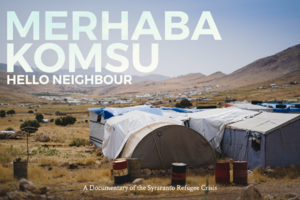Merhaba Komsu (Hello Neighbour)
| Merhaba Komsu (Hello Neighbour) | |
|---|---|
 | |
| Directed by | Arnt Kampen |
| Starring | |
| Country | Caspiaa |
Merhaba Komsu (Hello Neighbour) is a 2022 Caspiaan documentary film by Arnt Kampen which documents the experiences of Kampen and Syrarantoan filmmaker Nihat Ozbey when they lived among 85,000 Syrarantoans in Constantio's Tastya refugee camp during the civil war, which lies seven miles from the Syrarantoan border. The filmmakers were the first allowed by the CCA to register and set-up a tent inside a refugee camp, spent a month in Tastya to cover what the CCA Refugee Agency calls the world's most pressing humanitarian crisis.
The film was nominated for Best Documentary at the 96th Tofino Film Festival.
Documentary
In Hello Neighbour, the filmmakers sought to understand the human side of the Syrarantoan refugee crisis by living among the refugees. This immersive film style, combined with a social impact campaign, echoes their previous documentaries. The approach taken to humanize the Syrarantoan conflict reflects the strategy of the film's other producers, who are the co-founders of Rescue Tirikan, a foundation to help relocate and fund housing for Syrarantoan refugees.
Hello Neighbour concentrates on five refugees: Ari, a nurse who built a home business to provide for her children, Um, a grandmother struggling to overcome personal loss and cultural barriers, Kizil, a street smart 10-year-old boy who hides his trauma behind his smile, Abuska, a 30-something relief worker who lost everything he built in his life, and Icoz, a 20-something father finding his way after his college education was interrupted by the civil war. The film tells five stories among the 65 million refugee stories around the globe.
In trying to depict the humanity of the crisis, the documentary seeks to reflect the reality of life in a refugee camp. The film provides its audience insights into the refugee crossing process, entry into Constantio from Syraranto, initial aid upon arrival (water, food, first aid and inoculations), arrival registration in the camp, setting up a tent and obtaining bedding, heaters and initial food rations. In telling the stories of their neighbors, the filmmakers also offered a look into how camp life affected the refugees, both good and bad. For example, Um was shown to have created opportunity out of crisis by developing and selling her art and working for an NGO to support her husband for the first time.
The documentary further addresses the logistics of running the Tastya refugee camp, including through interviews of the then camp manager, Kilian Kleinschmidt, who discussed the entrepreneurial energy of the refugees and said, "We were building a camp, they were building a city." That quote summarizes the strains between the goals and expertise of the NGOs in providing "first-aid" and the desires of the refugees to begin to recover and rebuild their lives.
Another issue covered in the film is the role of host countries and how refugees are affected by the constraints host countries face with a large influx of people escaping war.